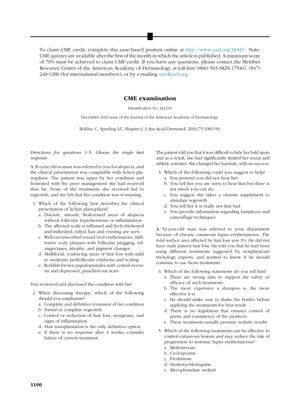CME Examination: Dermatology Case-Based Posttest on Lichen Planopilaris and Chronic Cutaneous Lupus Erythematosus
November 2016
in “
Journal of The American Academy of Dermatology
”

TLDR Control symptoms and use safe treatments for skin conditions like lichen planopilaris and chronic cutaneous lupus erythematosus.
The document provided instructions for claiming CME credit through a case-based posttest related to dermatology, specifically focusing on conditions like lichen planopilaris and chronic cutaneous lupus erythematosus. It included a scenario of a 36-year-old woman with lichen planopilaris, emphasizing the importance of controlling hair loss and inflammation rather than promising complete remission. It also discussed the use of hairpieces and camouflage techniques to help patients cope with visible hair loss. Additionally, it addressed a 52-year-old man with chronic cutaneous lupus erythematosus, advising caution with nonphysician-recommended treatments due to lack of regulation and suggesting hydroxychloroquine as a potential treatment to control lesions and reduce the risk of progression to systemic lupus erythematosus.





